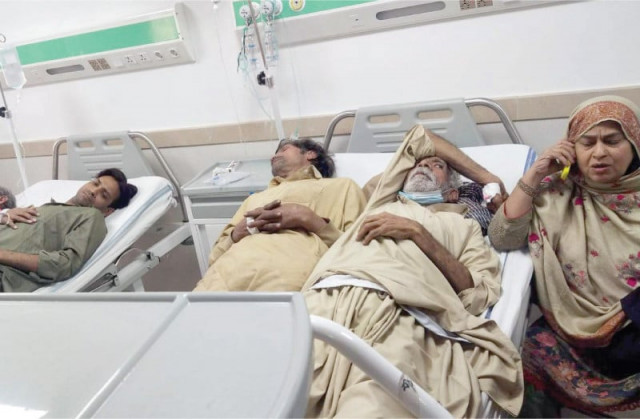Patients reel under budget cuts
Hepatitis medicines, diagnostic kits could not be procured for 2 years

The Khyber-Pakhtunkhwa (K-P) Health Department has failed to procure medicines and diagnostic kits for hepatitis B and C in the past two years which has subsequently created a severe shortage and hit needy patients hard.
As a result, many affected patients are forced to discontinue treatment due to the high cost of hepatitis treatment in the private market. The situation has caused concerns about a possible spike in hepatitis cases in the province.
Official sources told The Express Tribune that, apart from the lack of timely purchases by the Health Department, the Integrated HIV, Hepatitis and Thalassemia Program had also been facing a shortage of funds.
Similarly, there is no registration of hepatitis patients at the government level nor has a survey been conducted in the province to determine the exact number of patients and the prevalence rate.
Officials claimed that, in the year 2021, no medicines had been purchased for hepatitis B and C patients under the project. Only 2,400 registered patients had received medicines through donations.
Similarly, rapid tests and Polymerase Chain Reaction (PCR) test kits are also out of stock at 36 sentinel sites. According to sources, a PC-1 of Rs482 million had been submitted for the procurement of medicines in April 2022 which has remained stuck in files.
Later, a revised PC-1 of Rs526 million had also been developed which had met with various objections.
Sources also claimed that the former program manager’s alleged administrative negligence had also resulted in the non-purchase of hepatitis B and C medicines after which the Health Department had requested the federal and Punjab and Balochistan governments for a supply of medicines for a short period on a donation or loan basis.
The request had been meant to cater to the needs of both the previous as well as newly registered patients not covered under the program.
As a result, newly registered hepatitis B and C patients are now suffering due to the negligence of the Health Department.
“A patient suffering from hepatitis needs to spend at least Rs10,000 per month on medicines which is beyond the affordability of poor patients,” said an official, adding that the project management had informed the Health Director General about the situation through a letter dated October 9, 2023.
However, due to a financial crisis, no funds were released in 2023-24 either, and only top-up programs were being managed on an emergency basis.
Last year, according to sources, the Health Department had been forced to request medicines for hepatitis patients from the Sindh government. It is said that, previously, the PC-1 program used to cover hepatitis B and diagnostic services while the Prime Minister’s Program for hepatitis C used to manage the treatment of patients suffering from the latter disease.
Now, however, medicines for hepatitis C (and liver disease) have also been stopped.
He claimed that, although the Planning Cell had also been informed about the matter, no action had yet been taken.
Another letter had been sent on February 13 of this year which had also been ignored. It is also said that the Prime Minister’s Program for Hepatitis Control sent a letter to the K-P Health Department in April this year, highlighting some reservations.
The federal health ministry had pointed out that there was a gap in the program’s coverage at the provincial level which needed to be addressed through a PC-1, that the provincial government should bear at least 50 per cent of the cost of treating hepatitis C patients which should be included in the PC-1, and that mechanisms needed to be developed to improve performance, staff training and technical assistance.
Published in The Express Tribune, June 1st, 2024.



















COMMENTS
Comments are moderated and generally will be posted if they are on-topic and not abusive.
For more information, please see our Comments FAQ